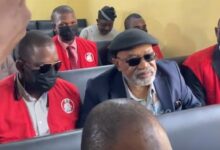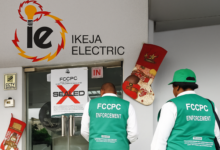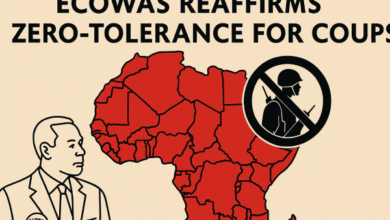We learnt contingency planning from COVID-19 experience, says NAMA boss

The Acting Managing Director of the Nigerian Airspace Management Agency (NAMA), Mr Matthew Pwajok, said the outbreak of COVID-19 necessitated the idea of contingency planning in the agency.
Pwajok made the disclosure while speaking at the News Agency of Nigeria (NAN) Forum on Sunday in Abuja.
He said that during the outbreak, the aviation industry was hard hit and that NAMA was not an exception as it suffered a major revenue challenge being a self-funding agency.
“So if there is anything we learnt to do, it is building of contingency, back-up or recovery system or business continuity plan, where we will be able to sustain services no matter what happens.
“We had a few of these instances where we had to provide or relocate the provision of services to a place like that.
“We also learned the need to build contingency funds, we are a government agency and you know TSA, all payments are in one account and it becomes difficult.
”Unlike when you have commercial banking, you can create an account where you can have dedicated funds in case of emergencies.
“In this case, we have learned the need to be able to build a funding system, where in the event of a situation like this that will affect revenue; we will be able to have something to fall back on.
“So very critical is the need to be able to build resilience both financially and in terms of equipment, in terms of personnel,’’ he said.

Pwajok said there were instances where an entire watch of air traffic controllers had to be isolated because one person was infected and the whole lot of them had to be isolated and later tested before they were re-integrated.
The NAMA boss said that in that instance, the agency had to seek additional manpower to provide and sustain services.
“So over time, we have learned the need for back-up, the need for resilience, the need for contingency planning in both financial aspect, in both materials, equipment and personnel aspect.’’
He explained that during the COVID-19 outbreak, airports had to be totally shutdown, services were basically restricted to essential flights; security flight, medical or cargo flights and other kinds of special flights such as diplomatic flights.
The NAMA boss said: “Because of the air navigation services and air traffic services that NAMA provides, there was no time that the air space was closed.
READ ALSO:https://brandeconomy.com.ng/nysc-advises-outgoing-corps-members-on-integrity-hard-work/
“This is because continuously we had a couple of special flights that were either going to evacuate people or ambulance flights coming to convey sick people or diplomatic flights or other flights that were over-flying the Nigerian air space.
“So, in NAMA, you can never totally shutdown because we owe an obligation to the international community to open our air space for other airlines or other citizens from other countries that will need to over-fly our airspace to other countries.
“So, we continuously provide services even if there was a shutdown and we have learned the need for building resilience.’’
Pwajok said that during the period, some NAMA staff contracted coronavirus and in line with protocols, facilities had to be shutdown and decontaminated before being re-opened.
He said that the control tower, being a critical and sensitive facility could not be shutdown and that four mobile control towers were acquired while two additional ones are being expected to arrive the country soon.
(NAN)










